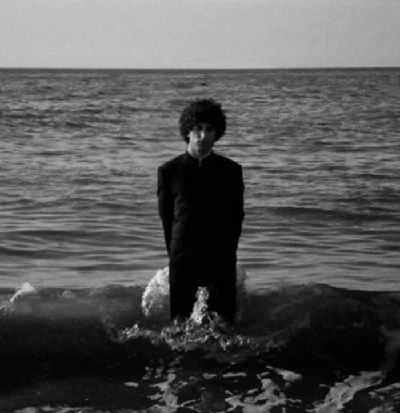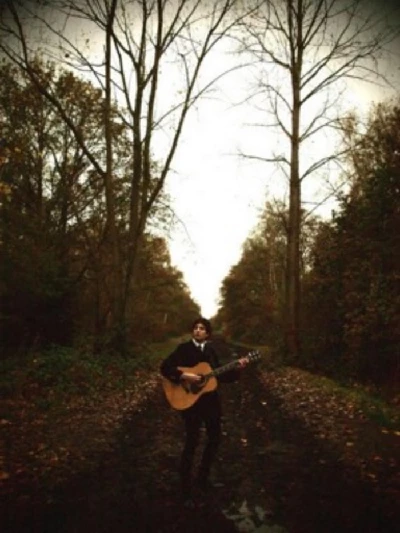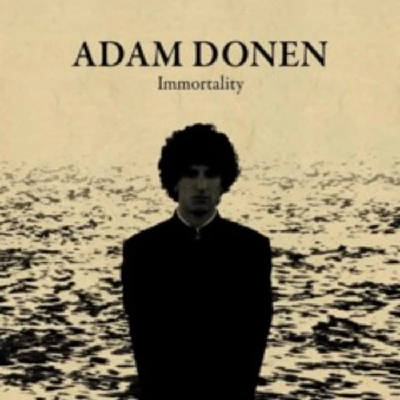published: 6 /
10 /
2010

South African-born and now London-based poet and singer-songwriter Adam Donen speaks to John Clarkson about his recently released debut album proper, the orchestral 'Immortality', which was inspired by a romantic break-up and is also a tribute to the last decade
Article
There is an air of intellectual authority to Adam Donen. One is left with the impression after talking to him that if he had not decided to cut a joint career for himself instead as both a musician and a poet, he would be a superb university academic. In an half an hour conversation with Pennyblackmusic, his sentences are peppered with references to S.T Coleridge, T.S. Eliot and elements of Nietzschean philosophy. With a lot of other twenty somethings, this might come across as somewhat forced and pretentious. 25 year old Cape Town-born Donen, however, is both slyly self-deprecating and dryly humorous. He also clearly knows what he is talking about. It is a reflection simply of who he is.
Literature is in Donen’s bloodstream. The eldest child of anti-apartheid activists, he made his first public performance at the age of six reciting poems by William Blake and Coleridge to ANC freedom fighters inside a South African maximum security prison. He took up playing guitar a year later.
Adam Donen moved to London at eighteen to study English and form a band. His first group, the Alexandria Quartet, which Donen named after a set of fifties-written philosophical novels by Lawrence Durrell, were violent and turbulent in sound and heavily political. The Alexandria Quartet were praised by critics and toured relentlessly in 2006 and 2007, but burnt out weeks after releasing their five song debut EP, ‘The Daydreams of Youth’ and after just sixteen months together.
Donen’s next release, ‘As Our Parents Slowly Turned to Clay’ (2008), which he recorded with a backing band he entitled The Drought, was a limited edition orchestral-tinged rock CD and poetry book that he confined to selling at gigs. His latest album, ‘Immortality’, and debut album proper, builds on the orchestration of its predecessor and maintains Donen’s characteristic sensual prose. Inspired in part by the break-up of Donen’s long-term relationship with his violinist, but also an elegy to the last decade, it, however, is a radically different record to ‘As Our Parents Turned Slowly to Clay’. While the strings and female backing vocals of the previous album remain, all drums and electric guitars have been removed. Its arrangements are also on a grander scale with new instruments being added including a flute and some brass.
‘Immortality’ was released by UK label, Walker and Orfing, in March and will be followed by a European release on a German label in November. Adam Donen will be spending much of the autumn and winter touring. He will be playing at the Pennyblackmusic Bands Night at the Half Moon in Herne Hill in South London on October 29th with the Willard Grant Conspiracy, the Monroe Transfer and Altai Rockets.
PB: Why did you decide to call this new album, ‘Immortality’? You concern yourself on it not just with romantic issues, but also the sort of political issues which occur through history time and time again. Was that a factor in you giving you that name as well?
AD: I don’t think that it was a conscious factor, but it is certainly something that I have since seen in it. When I am creating, I don’t look closely at anything. I will edit ten times to death, but I edit by feeling rather than an absolute sense of where I am going with it. A former bassist of mine, who was a terrible driver and who had a worse sense of direction than me (which in itself is quite astonishing), had a system of cornering whereby if she knew where a place was that she wanted to get to she would drive in a square and then a smaller square and a smaller square still until finally she got there. That is kind of what I feel I do with words.
PB: Do you see yourself primarily as a poet or as a musician?
AD: I see myself as both. When I was very young and in fact by the time I was six years old, my grandmother had introduced me to Coleridge. An accident of the television being left on at the wrong time introduced me to AC/DC’s ‘Thunderstruck’. Then another accident of a video shop opening next door to me, and the kindness of the person in the shop in introducing me to vampires, meant that I knew by the age of six that I was either going to be a musician or a poet or a vampire. The vampire thing dropped away for obvious reasons, but the others have stuck with me.
At some point in the future I would love to write a novel. I have tried twice previously and they were both absolutely abysmal, but I’d like to think that I am able to work in both music and poetry without one being my primary one.
PB: Is it words or music that comes first with you when you’re writing music or is it both?
AS: It changes from song to song. With the title track on ‘Immortality’ the words came to me first. The chorus-“So cling to the kerb/For not even the birds”- came to me first, but then it took me two and a half years to flesh out the lyrics. On another song on that album, ‘It’s Over Now’, the music and most of the words were all, however, written inside an hour. I always write my string parts afterwards, but I tend to write a main vocal and guitar melody along with the words.
PB: When you’re writing initially do you know if something is going to be a song or if it is going to be a poem?
AD: No. When I first start work on something, generally just a feeling will come over me that I need to be working on something and that I need to get rid of whoever is in the room with me. I will then settle down and flesh through whatever needs to be fleshed through and then after that I’ll figure out what that is.
PB: The Alexandria Quartet broke up fairly quickly after releasing ‘The Daydreams of Youth’ EP. You have said in previous interviews that you “dissolved by accident.” What did you mean by that?
AD: We were all very young at the time. The idea that we were rock musicians took over from the making of music. The result was a lot of heavily medicated touring that wasn’t particularly healthy. The combination of us lacking focus and me in particular ending up in a very, very bad place at the end of touring meant that once we stopped for the first time we didn’t really have the impetus to keep going again. I was also starting to get interested in string arrangements and other things that didn’t fit into the fairly simplistic and angry idea of what we were doing.
PB: The Alexandria Quartet was a very violent band musically. Both ‘As Our Parents Turned Slowly to Clay’ and ‘Immortality’ are much more orchestral in tone. Your voice has also changed on these two albums in the sense that it has become less shouty and more semi-spoken. Do you see both these albums a reaction against the Alexandria Quartet and that stage in your career?
AD: I don’t know if they are a reaction against that stage in that career. I think that each new record is a reaction to where I find myself at a given point in my life. I listened for the first time to ‘The Daydreams of Youth’ just a couple of days ago and I was absolutely blown away by how angry I was. ‘The Daydreams of Youth’ was, however, one particular form of trauma for a particular type of time and ‘Immortality’s is a very different one.
I wouldn’t be surprised if I ended up doing another electric guitar album at some point in my life. I think that what happened was I started getting interested in composition at the same time as I was starting to develop more tender and romantic sorts of feelings as opposed to the heavier, angsty stuff that I was coming up with earlier on.
PB: Why did you give ‘As Our Parents Turn Slowly to Clay’ such a limited release? You just made it available at gigs. That must have been commercial suicide.
AD: Yes, it was (Laughs). When I released it, commercial success was , however, the last thing that I wanted. I was widely inspired by a William Burroughs book, ‘Ah Pook is Here’. It is now available widely once more, but he did an original release of just one thousand copies and with the most beautiful illustrations inside. I loved the idea of something that had had masses of time spent on its creation, just being slowly dispersed from person to person and ultimately probably disappearing. I thought that would be a lovely thing to happen to it, but then of course MySpace came along (Laughs).
PB: ‘Immortality’ is much more acoustic-based than ‘As Our Parents Turned Slowly to Clay’. Was that also a conscious decision?
AD: Very much so. It was also a conscious decision not to use any drums on it. Another of the things that I was reacting against with ‘Immortality’ in comparison to Alexandria Quartet days, but also to some extent ‘As Our Parents Turned Slowly to Clay’, was the fact that we would be playing a lot of clubs with a lot of people off their face jumping up and down and dancing. The louder the music and the more inaudible what I was saying the more people would seem to enjoy it.
I found that very frustrating and had a bunch of things that I very particularly wanted to say and to be heard. I wanted the music on ‘Immortality’ to be almost an overspill of the words rather than to have any sort of rhythmic or percussive backing.
PB: There is, however, having said that, a real undercurrent of tension to some of the tracks on ‘Immortality’. On the title track in particular you feel that things might erupt at any moment, but it all remains very restrained and controlled and things build up gradually instead. Was that something that you were again aiming for rather than a more sudden sledgehammer effect?
AD: To go slightly philosophical I was very into Nietzsche at a fairly early age and he wrote about the Dionysian, the Dionysian being the mad, crazy state of mind where anything could happen and the Apollonian being a systematic, ordered thing where everything is planned and which has its own controlled beauty.
The lack of eruption on ‘Immortality’ was because every single note was scored in advance and very carefully written. That kind of effect does tend to turn everything back and force one to take a closer listen rather than allowing oneself to be swept away.
PB: ‘Immortality’ is a curiously old-fashioned CD in terms of its packaging as well as some of its themes. It uses an old-style font and text. Was that a deliberate attempt to go back to the past?
AD: I don’t think that I feel negative towards modern times. I feel more frustrated by it more than anything else, but I wanted the whole feel of the album to be not so much old, but that of an artefact. The packaging was one way that I figured it could feel like something ancient, although of course it is not yet (Laughs).
I was lucky because I worked with a very talented designer called Tom Dewey on both ‘Immortality’ and ‘As Our Parents Turn Slowly to Clay’. Our inspiration came from old Faber poetry books. That is a frustrated ambition on my part. I would love to have my work published by Faber, but that’s the next big thing (Laughs).
More seriously though, when I was growing up in South Africa, we were fairly backwards when it came to literature, but we did, have a lot of the old Faber books and that was what I grew up on. The first time that I read T.S. Eliot I read it in one of those editions and that was probably the biggest influence on my writing. We used an Electra font on ‘Immortality’. That’s the one they use in most of the old Fabers and all the editions with the intertwined ff’s on the front cover. The editions Tom and I used for reference were a ‘Collected’ Eliot, a ‘Collected’ Sylvia Plath and a ‘Selected’ Emily Dickinson, the latter of which was edited by Ted Hughes.
PB: What are you working on at the moment?
AD: The next disc, which is called ‘Vampires’, is in fact just finished , but before then ‘Immortality’ has just been picked up by a nice German label called Dandyland and they are giving it a European release in November. I am going to be doing a lot of touring around that.
‘Vampires’ will be out around May or June and so as far as the direction it has gone in I think that it is a far calmer album than anything I have done so far, but at the same time it’s infinitely larger. It moves at a slower place than any of the other discs, but it still at some points has as much violence as anything that I have done before.
PB: Finally what can we expect from you when you play the Pennyblackmusic Bands Night on the 29th October?
AD: You can expect a very intense performance. You can expect as well some string players and even a mini choir. I am really looking forward to that gig. The re-release party for ‘Immortality’ is happening in London three weeks after that, so I think we are probably going to be playing with the same line-up on both of those nights.
PB : Thank you.
A Century of Stone
The Riviera’s quiet now:
No more weeping for
The clay hands of an idiot coupling
That stabbed itself in the stone of its back.
The latest stab at love dissolves
To grainy pictures on a mobile phone
And a second pair of coloured eyes
That positively glowed.
And the world is built on glass and gold
That the brave alone may see,
But he who summons fire
Should beware of what he dreams.
I fell upon my satellites -
You have yours, I know.
Does our princess loll her tongue around
A century of stone?
* - * - *
Harpies rose beneath the cafe lights:
Magnolias and belladonnas
Writhing and coiling:
Your Ulysses walked among them.
Where childlike breastless sphinxes
Rubbed their paws inside their skirts, purring:
“One of these is pleasure, love,
But both of them are work.”
And the world is built on glass and gold
That the brave alone may see,
But he who summons fire
Should beware of what he dreams.
Now aerials puncture heavens
Where your heroes thought they’d roam
As gods scale down the deal
To a century of stone.
* - * - *
And the sweet girls fleet of Cleopatra gestures retreats:
You reverted to type at the turn of the tide, ever politic.
Your surrogates in pillowtalk expound upon the cause;
Moans of hotel memories sail on into the dark
Where drunken desert fumbles find
A pair of trunkless legs.
I know you too have looked upon them:
Tell me what they meant to you
And then decide if there's too little or much
To do as the empire falls:
The desert keeps its own accounts:
A century of stone.
* - * - *
Now the night turns white and the stars go black
On the checkerboard of nights and days
And all the scores will be erased,
But this stage too is play.
Kiln and charnel-house converge
As other things have and are,
Though the royalty of this holiday town
Didn't hear that there was a war.
But the matter is now soft enough -
Let the Sculptor start anew!
Your hero give himself to fire
As once he did to you.
Und so lang du das nicht hast,
Dieses: stirb und werde!
Bist du nur ein trüber Gast
Auf der dunken Erde.
(Whoever has not
This dying and becoming,
Is just a sad guest
On this dark earth.)
The lyrics for ‘A Century of Stone’, which appears on 'Immortality', have been reproduced with the kind permission of Adam Donen. More information about Adam can be found at www.adamdonen.com.
Picture Gallery:-

